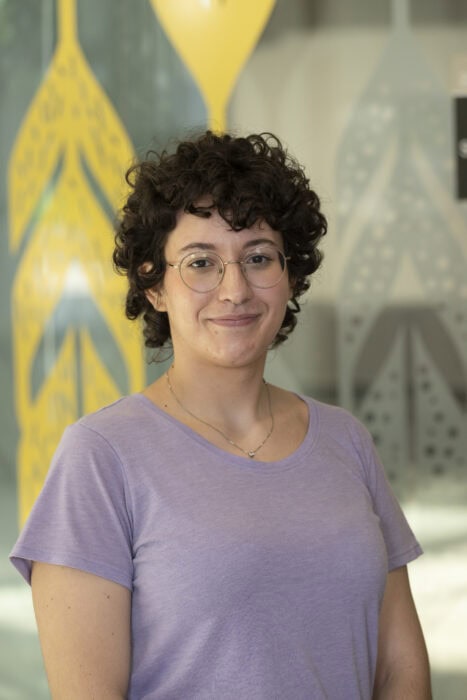Antonella M.A. Marsella she/her

Doctoral researcher in Computing Science
Strategic Research Areas
My research interests sit at the intersection of psychology, cognitive neuroscience, and emerging technologies, exploring how innovative and accessible digital tools can enhance cognition and support resilience, and overall quality of life.
My current work examines how AI and neuroadaptive systems can enhance cognitive performance and wellbeing through personalised, human-centred design. I am passionate about using technology as a bridge between scientific insight and real-world impact, creating tools that are adaptive, ethical, and inclusive.
I hold a BSc in Psychology from the University of Glasgow and an MSc in Clinical Health Psychology with Distinction from the University of Strathclyde. During my MSc, I co-authored a publication from collaborative research titled: “Neuroanatomical correlates and predictors of psychotic symptoms in Alzheimer’s disease: A systematic review and meta-analysis”
Equality, diversity, and inclusion matter deeply to me, both personally and as a researcher. As a woman and the first in my family to go into academia, I have learned how much our backgrounds shape the questions we ask and the solutions we imagine. My psychology studies have taught me that research is at its best when it includes a range of voices and perspectives. When certain groups are missing, important insights are lost.
What draws me to the DiveIn CDT is its genuine commitment to creating a research culture where inclusion is not an afterthought but something that drives innovation. I have seen how teams that lack diversity can create technology that misses the mark, producing tools that work well for some people but not for others, and systems that end up unintentionally excluding certain groups. Those gaps have real human consequences.
I want my research to be grounded in accessibility, fairness, and collaboration. Being part of a program that shares those values would help me grow as a researcher while contributing to work that makes technology more inclusive and impacts a wider range of lives.
Alongside my research, I volunteer with Penumbra and the Self-Harm Network, where I deliver psychological interventions and provide direct support to individuals facing mental health challenges.
Outside of academia, I’m a passionate climber—an activity that has taught me persistence, balance, and the value of moving through challenge with focus and grace. My favourite quote, which guides both my climbing and life philosophy, is:
“Move through space with beauty and intention in the most efficient way possible.”
AI-Driven Neurofeedback for Personalized Cognitive Training in Virtual Reality
My research explores how AI-driven neurofeedback and virtual reality (VR) can be combined to create adaptive, engaging, and inclusive tools for cognitive training. The project investigates how brain activity and physiological data can be used in real time to recognise when a person is focused, challenged, or overloaded—and to automatically adjust the experience to maintain an optimal state of engagement known as “cognitive flow.”
Flow, first described by Csikszentmihalyi (1990), refers to the mental state of deep focus and enjoyment when challenge and skill are perfectly balanced. Achieving this state has been linked to improved learning, motivation, and wellbeing (Alameda et al., 2022; Peifer et al., 2022). Using EEG and behavioural and physiological measures, my work aims to identify reliable markers of flow, such as patterns in theta and alpha brain activity, and apply these insights to the design of immersive, AI-supported training environments (Eschmann et al., 2022).
One of the key application areas of this research is in supporting individuals with attention-deficit/hyperactivity disorder (ADHD). People with ADHD often experience difficulties in sustaining focus and regulating attention, which can impact academic performance, work, and daily life. Adaptive neurofeedback in VR has the potential to provide real-time, engaging cognitive training that helps users recognise and self-regulate their attention levels. By tailoring feedback to everyone’s unique brain and behavioural patterns, these systems could enhance concentration, self-awareness, and emotional regulation in a motivating way.
Ultimately, this project aims to advance personalised digital health by developing neuroadaptive systems that optimise engagement, cognitive performance, and wellbeing. It aligns with the DiveIn CDT mission to promote digital inclusion and ensure that emerging technologies are accessible, ethical, and beneficial to diverse populations, including those with neurodevelopmental conditions such as ADHD.
Motivation
Attentional and other cognitive deficits are rising global health concerns (Tian et al., 2024). Existing cognitive-training systems are static and poorly personalized, leading to low engagement and limited effectiveness. Integrating AI-driven neurofeedback within VR offers an opportunity to create adaptive, immersive, and clinically relevant cognitive interventions.
Aims
- Identify multimodal biomarkers of cognitive flow. Using EEG, physiological, and behavioural data to detect when individuals are in optimal states of focus and engagement.
- Model and classify mental states by developing machine learning algorithms to distinguish between flow, non-flow, and cognitive workload conditions in real time.
- Implement adaptive feedback loops in VR by designing closed-loop systems that automatically adjust task difficulty, feedback, and sensory stimulation based on users’ current mental state.
- Evaluate the impact of adaptive training on engagement, flow, and cognitive performance.
- Explore translational potential for healthcare applications in cognitive rehabilitation and wellbeing by assessing how adaptive training influences attention, engagement, and cognitive performance across diverse populations, including those with ADHD.
Impact
The research will advance personalized digital health by creating neuroadaptive systems that optimize engagement and cognitive performance. Applications include cognitive rehabilitation for mild cognitive impairment, stroke recovery, and attention-deficit conditions, aligning with NHS and UKRI goals for scalable, AI-enabled healthcare solutions.
References
- Alameda, C., Sanabria, D., & Ciria, L. F. (2022). The brain in flow: A systematic review on the neural basis of the flow state. Cortex, 154, 348-364.
- Csikszentmihalyi, M., & Csikzentmihaly, M. (1990). Flow: The psychology of optimal experience (Vol. 1990, p. 1). New York: Harper & Row.
- Eschmann, K.C.J., Riedel, L. & Mecklinger, A. Theta Neurofeedback Training Supports Motor Performance and Flow Experience. J Cogn Enhanc 6, 434–450 (2022).
- Peifer, C., Wolters, G., Harmat, L., Heutte, J., Tan, J., Freire, T., Tavares, D., Fonte, C., Andersen, F.O., van den Hout, J. and Šimleša, M., (2022). A scoping review of flow research. Frontiers in Psychology, 13, 815665.
- Tian, C., Ge, S., Ma, L., Xiao, Y., & Xu, F. (2024). Panoramic view of cognitive impairment: interdisciplinary cognitive research. Frontiers in Neuroscience, 18, 1453945.
As part of my PhD research, I aim to develop an AI-driven neurofeedback and virtual reality platform that enables the real-time exploration and visualisation of cognitive flow and attention dynamics. I am enthusiastic about collaborating with academics and professionals who wish to apply, test, or expand this system in the context of digital health, cognitive training, or neurotechnology development.
With a background spanning psychology, neuropsychology, and cognitive science, I bring interdisciplinary expertise in experimental design, behavioural research, and cognitive assessment. I am particularly interested in applying psychological theory to the development of human-centred, adaptive technologies that support wellbeing and inclusion with a focus on projects that promote inclusive and evidence-based innovation in digital therapeutics.
Potential collaboration areas include:
- Clinical researchers and neuroscientists interested in cognitive rehabilitation, ADHD, or neurodevelopmental studies or cognitive decline.
- Digital health and AI startups developing adaptive or personalised healthcare technologies.
- Engineers and computer scientists working on biosensing, neuroadaptive systems, or brain–computer interfaces.
- Social scientists and ethicists exploring the implications of AI and neurotechnology for accessibility, inclusion, and mental wellbeing.
- Healthcare providers and policy-makers focused on translating neuroadaptive technologies into scalable, real-world solutions.
